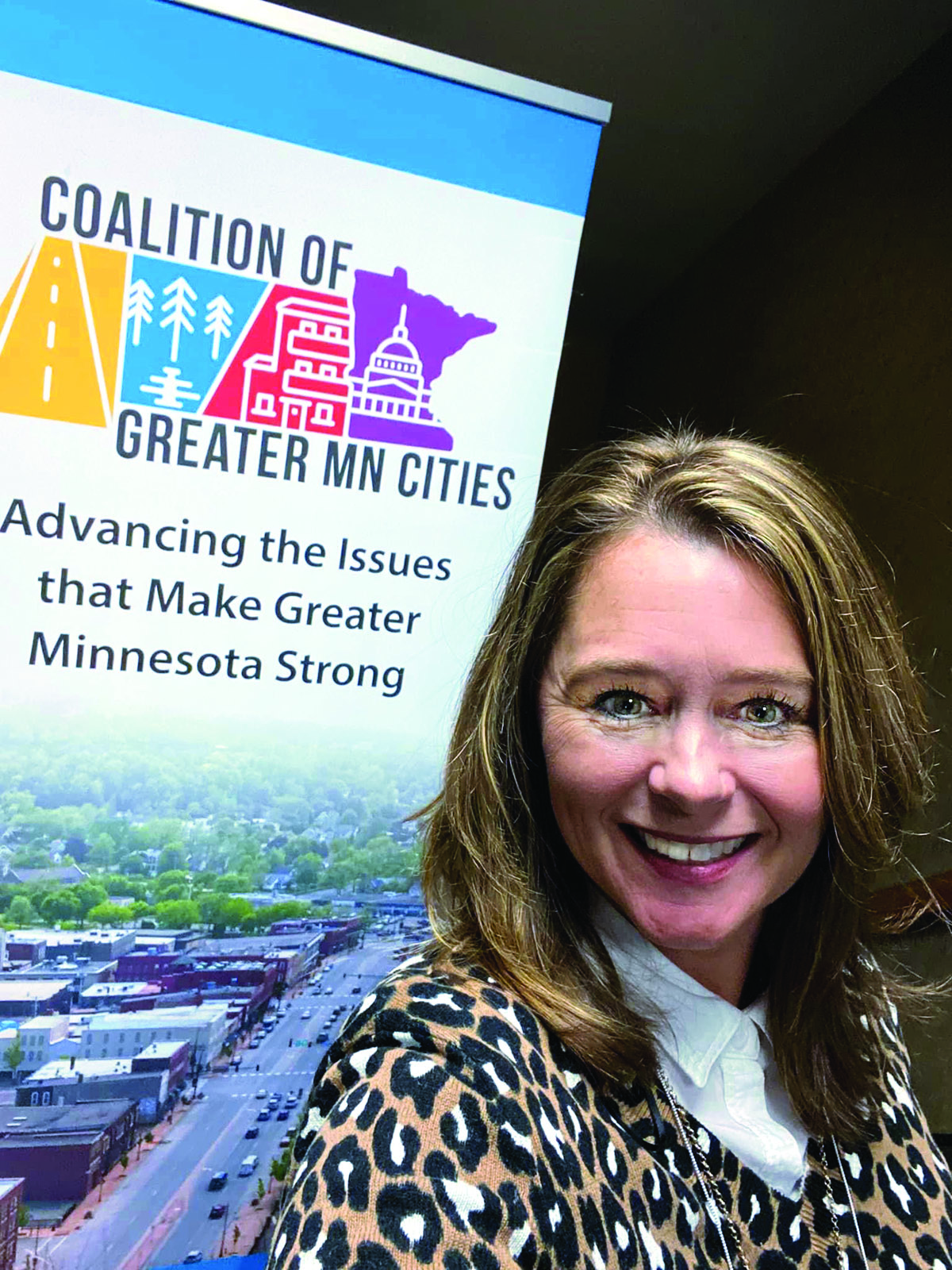
Moorhead Mayor Shelly Carlson has been elected president of the Coalition of Greater Minnesota Cities, only the second Moorheader to head the 100+ member group.
Nancy Edmonds Hanson
Moorhead Mayor Shelly Carlson has been elected president of the Coalition of Greater Minnesota Cities. It’s the second time a local leader has been chosen to head the 50-year-old group, formed by outstate mayors concerned that their communities were not receiving adequater attention from the State Legislature.
Morrie Lanning was the first local mayor to head the group, which represents more than 100 cities beyond Minneapolis-St. Paul. His term of office was from 1991 to 1993. Mayors Mark Voxland and Del Rae Williams served on its board during their terms of office, along with Scott Hutchins and Bruce Meseelt. Moorhead’s director of governmental affairs, Lisa Bode, has been the group’s treasurer since 2019.
“LGA – Local Government Aid – has always been our top issue,” Carlson observes. “We’ve worked hard to make sure the formula that determines it meets needs all across Greater Minnesota. It hadn’t changed for years until CGMC was finally able to get it adjusted.” It became a permanent part of the state budget in 2023.
Moorhead is currently the largest member of the coalition. This year, the city’s share of LGA amounts to $8,291,463.
Carlson has attended the coalition’s semiannual conferences and served on committees since she was elected to city government in 2016 as one of Ward 2’s two representatives on the council. She was appointed mayor in January 2023 and elected to a full term last November. The coalition elected her its vice president three years ago. She succeeds Rick Schultz, mayor of St. Joseph.
CGMC has focused its efforts on reaching the Legislature, both through professional lobbyists and its members’ frequent visits with legislators in St. Paul. Over the years, Carlson says, the coalition’s focus has broadened to encompass other issues affecting its member communities. During the 2024 session, that resulted in making progress in providing funding for dispatch and ambulance services in smaller cities. “It’s a huge issue, especially in smaller communities like Barnesville and Hawley,” Carlson says. “It’s a smaller issue here; I wasn’t aware of the huge amounts others are paying to maintain decent access until our meetings. You shouldn’t have to wait two to three hours for an ambulance, no matter where you live.”
The coalition counts the Legislature’s investment of $30 million in emergency medical services a win, though greater funding remains a goal. Carlson says, “It was a step in the right direction. We brought more attention to the issue, and we got a little funding, though it’s basically a drop in the bucket. We’ll bring it up again in the next session.”
The central question the coalition has asked of the Legislature is whether its programs benefit all Minnesota. “It’s an equity issue,” the new president points out. Over the years, CGMC’s focus has expaneded to include economic development, transportation, the environment and energy, annexation, and labor and employee relations.
Carlson has brought one emerging crisis to the group – the need to find ways to address the shortage of law enforcement officers all over Minnesota. “Right now, the eight weeks of skills training that applicants need is offered only in a few schools around the state. For us, the closest place where it’s offered is Alexandria Technical College,” she explains. “That means that after they complete their associate’s degree at M State here, they have to move 100 miles away for two months. For people who have families here to support and other commitments, that can be an impossible barrier.”
She compares the situation to Fargo and West Fargo, where the departments offer their own skills training and POST (Peace Officers Training Board) testing. “Our applicants can’t do that now,” she says. “That means our department is at a significant disadvantage. CGMC will be looking into it in coming months.”
The coalition, she says, has helped Moorhead remedy issues in the past; she looks forward to working with her counterparts to continue that advocacy over the next two years. “There are a myriad of ways that the Legislature’s actions affect our cities … many of them unanticipated by those who vote for them. The issue is often in the minutiae of the bills they pass, buried in how they’re actually aplied. Often, it’s our job to help our cities work out the unintended consequences of well-meaning legislation.”


